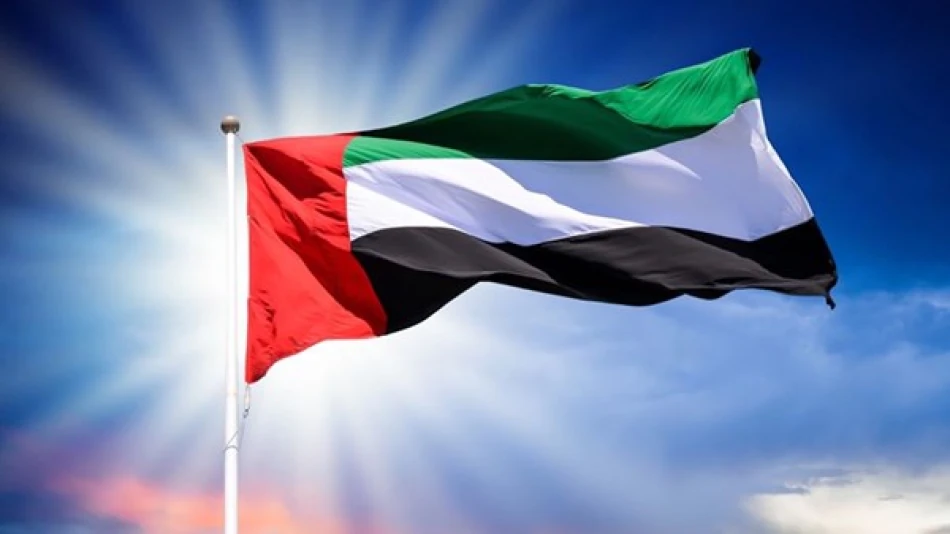
UAE Provides Vital Relief to Flood-Affected Yemenis on Western Coast
UAE Delivers Emergency Aid to Nearly 1,000 Families Hit by Yemen Floods
The United Arab Emirates has dispatched urgent humanitarian assistance to 960 families devastated by recent flooding along Yemen's western coast, reinforcing the Gulf nation's position as a key regional humanitarian actor amid Yemen's ongoing crisis. The aid package includes emergency shelter, food supplies, and essential materials designed to address immediate survival needs in one of the world's most challenging humanitarian environments.
Immediate Response to Natural Disaster
The Emirates Red Crescent Authority coordinated the relief effort, delivering emergency tents, food supplies, and basic necessities to families whose homes and livelihoods were swept away by the floods. Yemen's western coastal regions, already vulnerable due to years of conflict and limited infrastructure, faced additional devastation when seasonal rains triggered severe flooding across multiple districts.
The timing of this assistance proves critical, as displaced families face the immediate threat of exposure, hunger, and disease in the aftermath of the natural disaster. Emergency shelter and clean water access become life-or-death necessities in flood-affected areas where existing infrastructure has collapsed.
Strategic Humanitarian Positioning
Regional Leadership Through Aid
This latest intervention demonstrates the UAE's calculated approach to maintaining influence in Yemen through consistent humanitarian engagement. Unlike purely military or political interventions, humanitarian aid allows the Emirates to build goodwill with local populations while establishing a visible presence in strategically important regions.
The western coast of Yemen holds particular significance due to its proximity to key shipping lanes and the Red Sea corridor, making UAE involvement both humanitarian and geopolitically strategic. By responding quickly to natural disasters, the Emirates positions itself as a reliable partner for Yemeni communities regardless of political affiliations.
Comparison with Regional Approaches
The UAE's humanitarian strategy contrasts sharply with other regional powers' approaches to the Yemen crisis. While Saudi Arabia has focused heavily on military intervention and political solutions, the Emirates has increasingly emphasized soft power through aid delivery, infrastructure projects, and economic development initiatives.
This approach mirrors successful humanitarian diplomacy models used by countries like Turkey in Syria and Qatar in Gaza, where consistent aid delivery builds long-term influence and local support networks.
Broader Implications for Yemen's Recovery
Infrastructure and Climate Vulnerability
The flooding that necessitated this emergency response highlights Yemen's extreme vulnerability to climate-related disasters. Years of conflict have destroyed drainage systems, flood defenses, and emergency response capabilities, leaving communities defenseless against seasonal weather patterns that previously caused manageable disruption.
The UAE's focus on providing immediate relief addresses symptoms rather than underlying infrastructure weaknesses, but establishes the foundation for potential longer-term development partnerships. Emergency aid often serves as the entry point for more substantial reconstruction and development programs.
Economic and Development Perspective
From an economic standpoint, the UAE's humanitarian investments in Yemen serve multiple purposes beyond immediate relief. These interventions create opportunities for Emirati companies to establish relationships with local communities, potentially leading to future commercial partnerships once stability returns.
The consistent flow of UAE humanitarian assistance also demonstrates the Emirates' financial capacity to sustain long-term engagement in Yemen, signaling to other international actors that the UAE views Yemen as a priority for regional stability and economic integration.
Long-term Strategic Calculations
This flood response represents part of a broader UAE strategy to maintain relevance in Yemen's eventual reconstruction phase. By building trust through humanitarian assistance during crisis periods, the Emirates positions itself as a preferred partner for future development projects, trade relationships, and political cooperation.
The approach suggests the UAE has shifted from viewing Yemen primarily through a security lens to recognizing it as a long-term development opportunity that requires patient, sustained engagement through multiple crisis cycles.
Most Viewed News

 Layla Al Mansoori
Layla Al Mansoori






